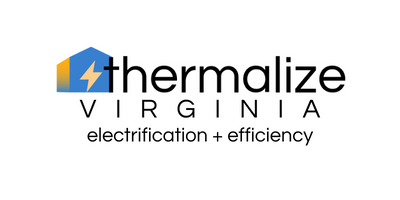Thermalize

- What is Thermalize Virginia? Is it like Solarize Virginia?
Yes, like Solarize where we demystify the solar process, with Thermalize we guide homeowners through the process of switching from fossil fuel (oil & gas) heating, cooling, and appliances to highly efficient heat pumps and electric appliances. The bonus is the home efficiency assessment and upgrades that happen first. We know, it’s a lot! We’ll be there for you throughout - Who is eligible?
This is a pilot serving homeowners in Northern Virginia and Charlottesville/Albemarle.
- Why should I Thermalize my home?
So many reasons. Health: all electric homes have higher quality indoor air. Safety: electric homes, unlike ones with oil and gas, have no combustion risk. Comfort: the efficiency assessment and upgrades eliminate drafts and ensure even comfortable inside temperatures. Climate: electrification has a lower environmental impact and helps meet climate goals. - How long will it take?
Depending on individual home needs, the entire process from start to finish should be no longer than 12 weeks. We are accepting sign ups through June 30.
- If you sign up, are you committed to an installation?
No! Thermalize participants will have the opportunity to learn about electrification and efficiency measures for their home, and then decide whether to move forward with an installation of a heat pump or heat pump water heater or other appliances like ranges. - How do I get started?
Simply fill out this form (Coming Monday May 16!) and we’ll be in touch with next steps. There is no obligation whatsoever!
Electrification
- What is electrification?
Electrification, or to electrify, is the process of converting space heating systems, water heaters, or appliances to run on electricity instead of another form of fuel such as oil, propane, or natural gas.
- Why is is beneficial to electrify my home?
By electrifying your home, a) you are helping reduce direct carbon emissions from the burning of fossil fuels, b) increasing the efficiency of your home by using less energy, and c) increasing indoor air quality by removing combustion appliances which are prone to leaking and potentially causing health and safety risks (see this recent report on gas stoves).
Heat Pumps
- What is a heat pump?
An air source heat pump (ASHP) is basically an air conditioner in reverse. In the summer, it will transfer the heat from the air inside your home to the outside. In the winter, it will pull air from the air outside to heat your home. Even though it is cold outside, there is enough heat to capture and concentrate in order to heat you home.
- Can heat pumps work in cold temperatures?
Yes! Heat pump manufacturers design a variety of heat pumps that are optimized for different climates. Cold climate heat pumps are rated to operate at temperatures below zero degrees fahrenheit.
- Can a heat pump produce enough heat for my home?
Yes! As long as a heat pump is properly sized and installed, it will provide enough heating and cooling for your home.
- How do you know what size heat pump to install?
- We recommend speaking with your contractor on designing a properly sized system. A Manual J calculation is conducted to determine a home’s heating and cooling loads, which will help determine the needed heat pump size.
- What kind of maintenance is involved with a heat pump?
There is little maintenance involved with a heat pump. Air filters will need to be changed periodically (1-6 months depending on filter and usage) to keep the unit running efficiently. Other than that, you want to be sure to clear any ice or dirt build up on and around the exterior unit. It is recommended to have a check up, or tune up, performed at least once a year by a professional.
- Will a heat pump also provide cooling?
Yes! A heat pump will provide heating and cooling for your home.
- Are heat pumps noisy?
Current heat pumps are designed to operate very quietly. Exterior units, though louder than interior units, are generally not heard much from inside the house. When speaking with the installer on the design of the system, it is recommended to discuss where you may want the exterior unit to be installed. Generally, you probably do not want to install it next to a bedroom window.
- Why is the air coming out of my heat pump not as hot as the air that comes out of my furnace?
Heat pumps and furnaces work in different ways to provide heat. A furnace will provide short bursts of hot air to a house, while a heat pump will provide warm air to a house for longer periods of time. The total measure of heat is the same, however, heat pumps produce this heat much more efficiently.
